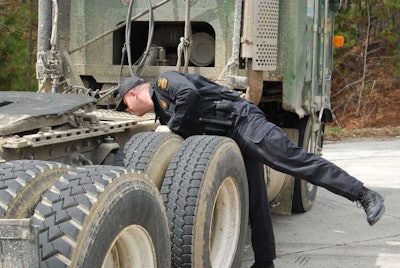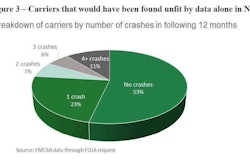
The December-passed FAST Act highway bill requires the reforms to the CSA system following the myriad of reports pointing out the system’s major flaws.
Even though the initial comment period ended May 23, those still wishing to comment can respond to comments already made in the docket until June 23. The full list of comments made can be found here.
The Notice of Proposed Rulemaking outlined FMCSA’s plan to update its safety rating system for carriers by integrating on-road safety data from inspections, along with the results of carrier investigations and crash reports. All of this would determine a motor carrier’s overall safety fitness on a monthly updated basis.
The SFD rule would replace the current three-tier federal rating system of “Satisfactory, Conditional and Unsatisfactory” for carriers with a single determination of “Unfit,” which would require the carrier to either improve its operations or shut down.

The Owner-Operator Independent Drivers Association said in its comments that using the same data that’s used within the CSA Safety Measurement System will, like CSA does now, result in unreliable safety determinations.
“To the extent FMCSA’s proposal continues to rely upon Motor Carrier Safety Information System (MCMIS) data in its current form to make safety fitness determinations, it will be defective no matter how it changes its methodology,” OOIDA said in its comment. “The data does not represent a valid or reliable basis for independently measuring a motor carrier’s safety fitness.”
The trucker advocacy organization added that a “large portion of the data are simply allegations of violations reported by state and federal personnel from roadside inspections – allegations that drivers do not have the opportunity to challenge before an independent fact finder.”
OOIDA also said the variability in the rate of violations from state-to-state is so high that, even with accurate reporting, the data won’t allow for accurate comparisons.
Owner-operator Steve Bixler, president of D&S Bixler Trucking, made comments along the same lines as OOIDA, saying the CSA program has been flawed from the start, and that FMCSA would be using flawed data to revoke drivers’ and carriers’ operating authority.
FMCSA dismissed some of these concerns in April, saying the FAST Act didn’t limit its ability to proceed with the rule, as Overdrive reported. The U.S. House’s Appropriations Committee, in its DOT funding package, included language that would block the SFD rule until reforms are made to the CSA system. A coalition of Representatives also voiced its opposition to the proposed rule until the CSA reforms are made.
Not all commenters were opposed to the rule, though.
Clint Larby, the owner of a 35-truck operation in the northern Midwest, said the rulemaking would benefit a company in a situation such as his.
Larby said his company was the subject of an hours-of-service audit in early 2015, which resulted in a safety downgrade. He said since then, his company has fixed its problems, but has to wait on an inspector to come back out for another audit, and in the meantime, his company is stuck in “conditional hell.” He said that with the proposed rule, his company would get its appropriate rating without having to wait on the audit the company has requested.
Other commenters on the rule include:
•ATA: The American Trucking Associations agreed with OOIDA, saying that it is “strongly opposed” to the SFD proposal because it uses the same data as the current Compliance, Safety, Accountability Safety Measurement System. ATA did say, however, that if the FMCSA could make the needed improvements to make the SMS system reliable, then it could support a future proposal similar to this one.
•Werner: Major carrier Werner (No. 11 on the CCJ Top 250) agreed and said the rulemaking should be suspended until reforms to the CSA are complete. Werner, along with Knight Transportation (No. 24), also said the rule shouldn’t be one size fits all, and the number of inspections with violations before a carrier is subject to the failure thresholds, which FMCSA set at 11 in the NPRM, should depend on the size of the fleet.
•Broker groups: The Transportation Intermediaries Association said it believes all crash and violation data should be removed from public view and only used to help FMCSA determine whether a carrier should be removed from the road. TIA said it’s FMCSA’s job, not the public’s, to police motor carriers, and FMCSA needs to be the one making a safe or unsafe designation. TIA added that FMCSA needs to make a final proposed unfit designation public as soon as possible to ensure that shippers, brokers and receivers don’t continue to use unsafe carriers.











